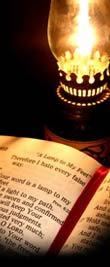often i get a response of "i don't like to read" or some variation of it.
while i understand the sentiment of not doing things that one doesn't enjoy, i am becoming more and more convinced as i get older that reading is in a category that is exempt from "i don't like it so i don't do it".
i am tempted to compare it to eating vegetables even when you don't like them, but that is too negative of a comparison. i think a lot of times we say we don't like something without knowing if we do or not. (again.. the food comparison).
how do we continually grow in our faith if we don't read? we can listen to sermons and participate in dialogue, but those are, for the most part, passive interactions and where they are more active, they are dependent on information we already have.
how are we continuing to learn and grow and sharpen our minds?
at least one answer is "by reading."
i came across this excellent article over at the desiring god blog. here are some excerpts:
Christians are people of the book: God purposely chose
the medium of typography to deliver his revelation to us.
In that book, we are commanded to love God with our
hearts and our minds (Matthew 22:34-40). This gives
Christians a clear command to use their intellects —
to be, in other words, a kind of intellectual.
Reading is one of the best ways to develop our minds.
It can help us to know God and ourselves, gain vicarious
experience, increase our perception and imagination,
train our minds to think critically and logically, and
teach us self-discipline. (For more on this, see Neil
Postman's excellent Amusing Ourselves to Death.)
But we have a problem: our culture is becoming aliterate.
We have the ability to read but not the desire.
Or maybe some of us have the desire but not the time.
We make time to watch television and surf
the Internet for the latest triviality, but we
can't seem to make the time to sit down and read for an hour.
Christians should be readers. We should read and meditate
on the Bible, of course, but we should also read theology.
Good theology systematizes and explains the Bible in ways
we would be pressed to come up with on our own. Few of us
are a Jonathan Edwards, John Owen, J. I. Packer or John Piper,
and we would be wise to learn from them.
...
to be a reader doesn't mean you have to read only large books with hundreds of pages full of words that you don't understand. there are many books written specifically for those who want to grow in their understanding without demanding a degree in literature or theology.
if you were to only read 20 pages a day, a great number of books could be read in less than 2 weeks.
here are a few that contain a wealth of information good for the heart and mind that are easily accessible. (click titles for links)
the dangerous duty of delight by john piper
knowing god by j.i. packer
the holiness of god by r.c. sproul
what is a healthy church? by mark dever
according to plan by graeme goldsworthy
christian beliefs:20 basics every christian should know by wayne grudem
